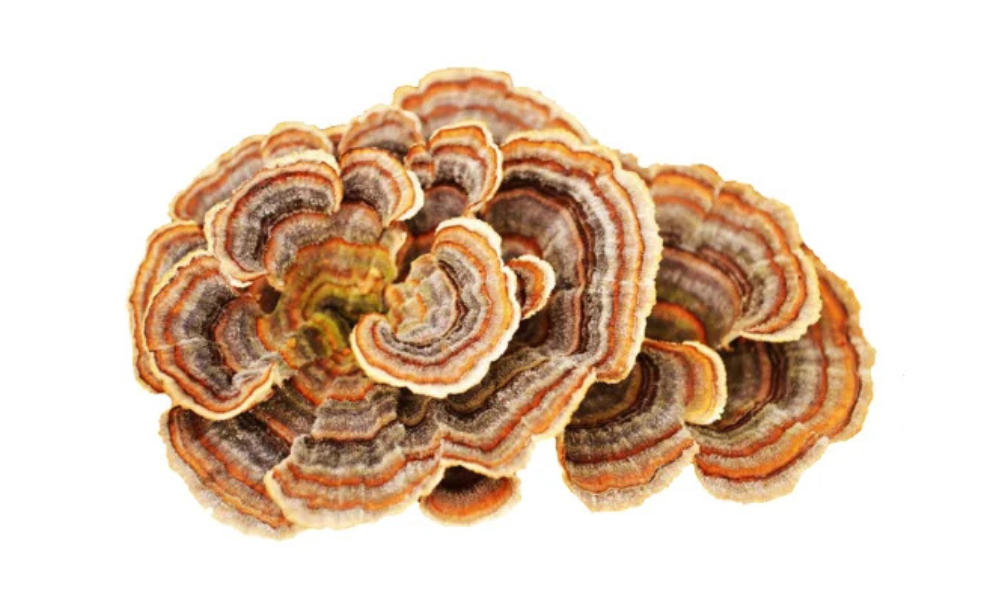Other Names
Trametes versicolor is also known by a variety of names, including Coriolus versicolor, Turkey Tail, Kawaratake, Yun-Zhi (云芝), polysaccharide K (PSK), polysaccharide-peptide (PSP), and versicolor polysaccharide (VPS).
Overview
Formerly classified as Coriolus versicolor and Polyporus versicolor, Trametes versicolor is one of the most common polypore mushrooms found across the globe. Its Latin name, "versicolor," translates to "of several colors," reflecting its striking, multicolored appearance. The name "Turkey Tail" comes from its resemblance to the tail feathers of a wild turkey. In traditional Chinese medicine, it is known as Yun-Zhi and has been used for centuries for its healing properties.
Characteristics
This mushroom features a leathery, thick cap with a rounded or triangular shape. The cap varies in color, ranging from rust-brown to dark brown with blackish patches. Some specimens may even display green algae growth. Its visual diversity makes it easily recognizable in the wild.
Medicinal Uses
Trametes versicolor holds a prominent place in traditional Asian medicine, particularly in Chinese and Japanese herbal remedies. Its extracts—PSK, PSP, and VPS—are being studied for their potential role in complementary cancer treatments. These substances are polysaccharides, complex carbohydrates made up of numerous sugar molecules. They are believed to support the immune system and exhibit anti-cancer properties.
In the United States, the Food and Drug Administration (FDA) has approved Trametes versicolor as a dietary supplement. Its extracts are available in various forms, including capsules, teas, and liquid solutions.
Administration and Availability
Coriolus versicolor can be consumed in multiple ways, such as:
- Capsules
- Extracts
- Teas
Dosages typically range from 1 to 9 grams per day, depending on the individual’s condition. These products are readily available at herbal medicine shops, health food stores, and online marketplaces. PSP and VPS extracts, in particular, are popular dietary supplements in the U.S.
References
- Coles, M., & Toth, B. (2005). Lack of prevention of large intestinal cancer by VPS, an extract of Coriolus versicolor mushroom. In Vivo, 19, 867–871.
- Fisher, M., & Yang, L.X. (2002). Anticancer effects and mechanisms of polysaccharide-K (PSK): Implications for cancer immunotherapy. Anticancer Research, 22, 1737–1754.
- Memorial Sloan-Kettering Cancer Center. (2008). About herbs: Coriolus versicolor. Retrieved from http://www.mskcc.org/mskcc/html/69194.cfm
- Nakazato, H., Koike, A., Saji, S., Ogawa, N., & Sakamoto, J. (1994). Efficacy of immunochemotherapy as an adjuvant treatment after curative resection of gastric cancer. The Lancet, 343, 1122–1126.
- Ng, T.B. (1998). A review of research on the protein-bound polysaccharide (polysaccharopeptide, PSP) from the mushroom Coriolus versicolor (Basidiomycetes: Polyporaceae). General Pharmacology, 30, 1–4.
- Torisu, M., Hayashi, Y., Ishimitsu, T., et al. (1990). Significant prolongation of disease-free period gained by oral polysaccharide K (PSK) administration after curative surgical operation of colorectal cancer. Cancer, 31, 261–268.
- Toth, B., Coles, M., & Lynch, J. (2006). Effects of VPS extract of Coriolus versicolor on cancer of the large intestine using a serial sacrifice technique. In Vivo, 20, 341–346.
- Tsang, K.W., Lam, C.L., Yan, C., Mak, J.C., Ooi, G.C., Ho, J.C., et al. (2003). Coriolus versicolor polysaccharide peptide slows progression of advanced non-small cell lung cancer. Respiratory Medicine, 97, 618–624.
- University of Texas MD Anderson Cancer Center. (2008). Coriolus versicolor: Detailed scientific review. Retrieved from www.mdanderson.org
Disclaimer
This information may not cover all possible claims, uses, actions, precautions, side effects, or interactions. It is not intended as medical advice and should not be relied upon as a substitute for consultation with your doctor, who is familiar with your medical situation.





